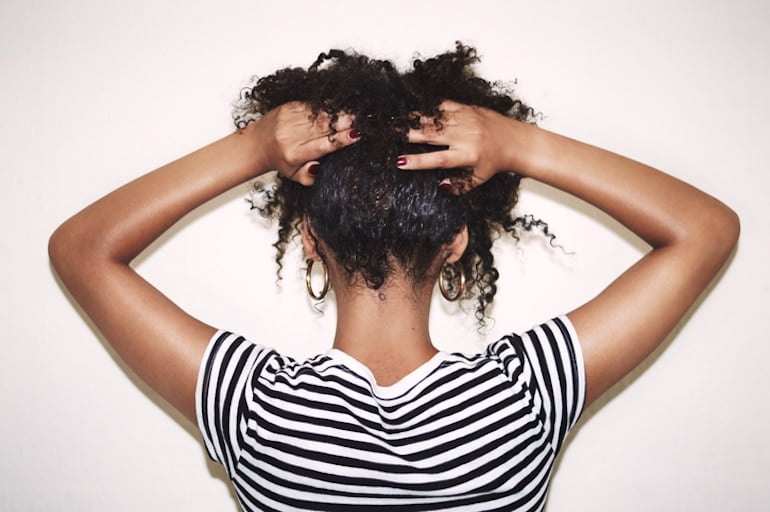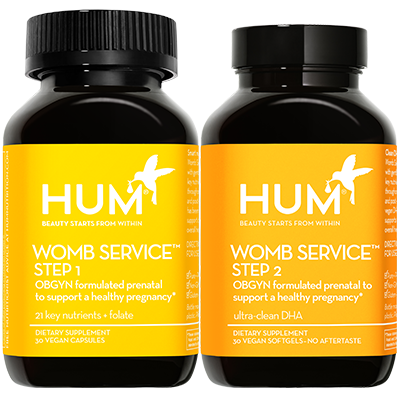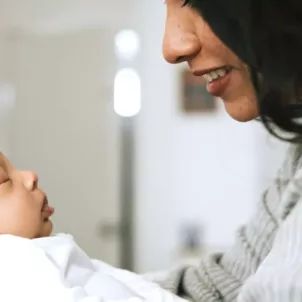Shavonne Morrison, MS, RD, LD, addresses questions related to pregnancy, prenatal vitamins, and hair growth.
If you’re on a mission to grow thicker, longer hair, or have experienced some hair loss, you might have heard of a variety of solutions, including prenatal vitamins. But wait, do prenatal vitamins make your hair grow? Before you take prenatal vitamins for hair growth, there are a few things you should consider before supplementing with prenatals—especially if you aren’t pregnant or trying to conceive.
First, if you fall into that category of pregnant or planning to be pregnant, we’ll talk about the changes in hair growth during pregnancy. Then, we’ll take a look at what science has to say about taking prenatal vitamins for hair growth. Regardless of whether you’re pregnant or not, the nutrients in prenatal vitamins, from folic acid to vitamin D, are essential to your health—and your hair.
How Pregnancy Changes Your Hair
Pregnancy is a time of exponential growth and development for the baby. To facilitate this, the mother’s body undergoes many hormonal changes. These changes—combined with increased blood volume and circulation—could be the reason for healthier-looking, longer hair.
The main hormone at work here is estrogen. Estrogen prolongs the growth phase of hair during pregnancy. For many, this means less hair loss and breakage, resulting in healthy, shiny hair.
On the flip side, many women experience postpartum hair loss. Once estrogen levels begin to return to normal, hair is more likely to fall out at a higher rate.

Do Prenatal Vitamins Help with Hair Growth?
Hair seems to grow naturally during pregnancy. So do prenatal vitamins also make your hair grow while pregnant? Although there’s a correlation between prenatal vitamin consumption and hair growth during pregnancy, that doesn’t necessarily mean that prenatals cause hair growth.
However, a 2018 study found that women may experience thicker nails during pregnancy. Interestingly, there was no difference in the growth rate of nails—only nail thickness. This indicates that since pregnancy hormones impact nail thickness, they may similarly impact hair thickness.
Overall, research doesn’t support the idea that prenatals will help your hair grow. However, a diet rich in vitamins A, C, D, E, B vitamins, iron, and zinc very well could!
Best Vitamins in Prenatals for Hair, Skin + Nails
While some may be tempted to take a prenatal for hair benefits, you can also get key vitamins and minerals from a high-quality multivitamin or through food.
Here are the top beauty-boosting nutrients to look out for.
Vitamin A
Healthy, moisturized skin—as well as a nurtured scalp—requires vitamin A. It facilitates the proper production of sebum, the oil your body naturally produces.
Vitamin C
A powerful antioxidant, vitamin C can neutralize free radicals (molecules that can cause oxidative stress in the body and impair hair growth) without becoming unstable itself. It also increases the absorption of iron, which is necessary for hair growth.
Vitamin D
The role of vitamin D for hair growth/loss isn’t conclusive. But according to a 2019 study, there may be a substantial link between having enough vitamin D and avoiding hair loss.
Vitamin E
Also an antioxidant, vitamin E has similar effects on the body to vitamin C in terms of reducing oxidative stress and promoting hair growth. Vitamin E is known to improve skin’s smoothness and help maintain its moisture. This includes the skin on your scalp—and a major component of having healthy hair is maintaining a healthy scalp.
B Vitamins
B vitamins—specifically biotin (vitamin B7)—are involved in the health of your hair, skin, and nails. In particular, some studies link biotin deficiency to hair loss. In particular, a 2017 study found that 38 percent of study participants reporting hair loss had a biotin deficiency.
Iron
This mineral is important for carrying oxygen to every cell in the body. Iron deficiency symptoms include weak/brittle nails, paleness/pallor, and hair loss.
Zinc
Lastly, zinc deficiency is commonly associated with hair loss in people of all genders. A zinc supplement might be necessary in some cases.
Folic Acid
Also known as vitamin B9, or the most available form of the vitamin, folate, folic acid is one of the essential vitamins in prenatal vitamins. It’s recommended in both pre-conception and all throughout pregnancy in order to prevent birth defects. Some studies have suggested that it can also potentially be used to treat hair loss, according to a 2019 review, but the research is still inconclusive.
Calcium
You can also find calcium in prenatal vitamins, which is key to both fetal bone development and maternal bone health. When it comes to hair health, calcium is also a crucial mineral to avoid hair loss, particularly during the perimenopause period, a 2016 study reports.

Can you take a prenatal if you aren’t pregnant?
Will prenatal vitamins help with hair loss, even if you aren’t pregnant? Hold on before you take that supplement. If you’re not pregnant, there are a few things to consider before taking a prenatal vitamin for hair growth.
The main concern with taking a prenatal when you aren’t pregnant (or planning to be) is iron toxicity. Nonpregnant women need 18 milligrams of iron per day, compared to pregnant women who need 27 milligrams.
Taking too much iron daily over a long period of time can lead to symptoms such as:
- stomach pain
- constipation
- liver complications
However, some prenatals don’t contain any iron at all. (Many brands exclude iron since needs during preconception and pregnancy are unique.) In short, your best bet is to investigate the label thoroughly if you decide you want to take a prenatal.
Calcium is another nutrient of concern when taking a prenatal outside of pregnancy. In the long run, getting more calcium than your body requires could contribute to kidney issues. (However, drinking lots of water and taking your supplement with a meal may mitigate this risk.)
Folic acid is a similar case; though it’s an integral nutrient to conception and pregnancy, it’s not advised to take much more than the upper limit, which is about 1,000 milligrams a day for adults (the recommended daily intake for pregnancy is 600 milligrams and 400 milligrams for all other adults). Some studies imply that taking well over the daily upper limit of folate could increase the risk for certain cancers. As long as you’re not taking double or triple the recommended amount, it shouldn’t have major detrimental effects on your health. That said, you’ll generally require a bit less folic acid outside of pregnancy, and a prenatal vitamin might not be necessary if you’re not pregnant.
Foods That Help Hair Growth
A diet that promotes healthy skin, hair, and nails will include fruits, vegetables, and healthy fats while limiting processed foods. In other words, a healthy diet equals healthier hair.
The following foods are high in the vitamins and minerals necessary for hair growth and strength.
1. Eggs are a great source of vitamins A and D. They also contain biotin. Egg yolks in particular are rich in hair-growing vitamins. In patients with trouble growing hair, biotin can improve their ability to maintain growth.
2. Citrus fruits such as oranges and grapefruits are full of vitamin C. They also contain vitamin A. Many fruit juices are also high in vitamin C.
3. Sweet potatoes are rich in vitamin A. One baked sweet potato has over 150 percent of your daily vitamin A needs.
4. Nuts and seeds—such as almonds, pumpkin seeds, chia seeds, flax seeds, walnuts, cashews—are full of essential vitamins, minerals, and healthy fats including vitamin E and zinc, that help strengthen your hair and promote growth.
5. Lentils and white beans are good sources of iron and zinc. These minerals are important for maintaining color, strength, and elasticity in hair.
6. Whole-grain foods are often fortified with B vitamins. Choosing whole-grain bread and cereals over conventionally processed ones means you get even more of their nutrients!

Alternative Supplements for Hair Growth
If the idea of changing your diet overwhelms you, you may prefer to take a multivitamin instead of prenatal vitamins for hair growth.
Multivitamins can help fill in gaps in your diet while providing key vitamins and minerals for hair growth. A multivitamin is also a good option if you don’t want to worry about the risks of getting too much of any vitamin or mineral, such as iron.
You can also take supplements specifically formulated for hair growth.
For instance, HUM’s Hair Sweet Hair gummies have B vitamins, zinc, and herbs like fo-ti that are proven to help you grow longer, stronger hair. Since they’re especially beneficial for your hair, a hair growth supplement might be your best option to avoid exceeding your nutritional needs.
Final Thoughts
Prenatals are formulated for women who are pregnant or trying to become pregnant. While they certainly include vitamins and minerals necessary for healthy hair, you may be better off taking a multivitamin or hair growth supplement to reach your goals.*
Taking high amounts of certain nutrients unnecessarily can cause undesired side effects and even mask other issues. Ultimately, only you and your doctor can determine if it’s safe for you to take a prenatal for hair growth.
Better yet, upgrade your diet to benefit hair growth and overall health alike.
*Note: Since many pregnancies are unplanned, it’s not unwise to consider taking a prenatal if there’s a potential that you’ll get pregnant. Getting adequate amounts of folate, choline, DHA, and other nutrients in these supplements is crucial for optimal maternal and infant health.
Many women don’t have adequate amounts of these vitamins before pregnancy. Of note, they’re highly important in the early stages of pregnancy, even before many women even realize they’re pregnant.









